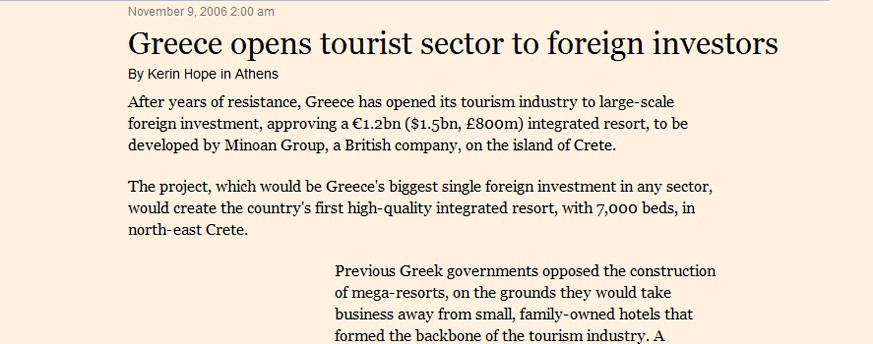After years of resistance, Greece has opened its tourism industry to large-scale foreign investment, approving a €1.2bn ($1.5bn, £800m) integrated resort, to be developed by Minoan Group, a British company, on the island of Crete.
The project, which would be Greece’s biggest single foreign investment in any sector, would create the country’s first high-quality integrated resort, with 7,000 beds, in north-east Crete.
Previous Greek governments opposed the construction of mega-resorts, on the grounds they would take business away from small, family-owned hotels that formed the backbone of the tourism industry. A scarcity of world-class accommodation complete with golf courses and other sports facilities has slowed the growth of Greek tourism compared with that of Turkey and Egypt.
Many hotels used by UK and German tour operators, the main source of tourists visiting Greece, date from the 1970s and 1980s. The deaths last month of two British children, apparently from carbon monoxide poisoning, at a hotel on Corfu has thrown a spotlight on the sector’s lacklustre facilities and maintenance standards. The government, which has responded by vowing to tighten regulation of hotels and their facilities, is also for the first time inviting foreign investment in the sector.
George Souflias, the public works and environment minister, said the resort would “strengthen the local economy, create new jobs and set a precedent for attracting major foreign investments”.
Approval of the project at Cava Sidero, first launched 12 years ago, was held up by successive governments until the current administration pushed it through. The 6,000-acre site, a peninsula rich in sandy beaches, archaeological remains and rare plants, was offered to the developers by a foundation set up by a Greek Orthodox monastery.
The project triggered opposition from politicians, ecological groups and local hotel companies. The UK group’s subsidiary, Loyalward, faced long delays in getting approval for permits. Procedures for the environmental permit, which was approved by Mr Souflias this week, were started in 2000.
Christopher Egleton, Minoan’s chairman, said the group had revised its development plan to ensure “more sustainability” to keep up with rising international standards on the environment. “The high-quality leisure market is moving towards a greener future, so projects that supply this are going to achieve premium prices,” he said.
Infrastructure would include a desalination plant, rainwater collection units and two wastewater treatment and recycling plants, to maintain facilities including two championship-standard golf courses.
The first of six tourist “villages” is due to open in 2009. The Cava Sidero resort is expected to feature a few luxurious hotels to be managed by an international chain.
Crete is the most popular Greek tourist destination, with more than 2.2m visitors last year. But growth in the island’s arrivals has averaged less than 4 per cent yearly over the past 10 years, according to official figures. The average stay has become shorter, while per capita spending has only narrowly outpaced inflation.
Miltos Kambourides, managing partner at Dolphin Capital, an Athens-based development company, said high-quality, integrated resorts “could rescue the Greek tourism industry”.

